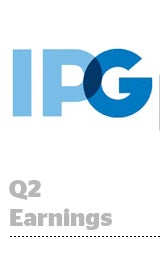 Interpublic Group (IPG) on Friday reported Q2 revenue increased 5.4% YoY to reach $1.85 billion.
Interpublic Group (IPG) on Friday reported Q2 revenue increased 5.4% YoY to reach $1.85 billion.
IPG reported a 4.7% increase in organic growth, with organic growth in global markets exceeding that in the US. Net income hit $103.7 million, a notable increase from $86.1 million a year ago. According to the company, the quality of its agency offerings coupled with strength in high-growth regions to fuel performance in 2014’s second quarter.
“Interestingly, this is the first time that digital has exceeded network spend,” holding company CEO Michael Roth noted. “We forecast it to overtake all broadcast spend in the next couple years and obviously programmatic buying has something to do with that.”
Programmatic will continue to be an important part of how the company will approach buying, Roth said, particularly on the digital side.
“The efficiencies of automation and programmatic buying are here to stay,” he said during Friday morning’s earnings call. Whether this will translate into public or private exchanges remains to be seen, but he added, “It’s all about data and being responsive to reaching consumers in a more efficient way. We have to be able to invest in that, and we are.”
Programmatic helped fuel IPG’s growth and margins, he said, because it pulled the holding company up the value chain in how it’s able to advise clients.
IPG’s media investment division Magna in mid-July began experimenting with programmatic buying for the ABC network’s online properties.
At that time, Magna’s EVP and head of US investment, Todd Gordon, said in a press release that such a partnership would “create market-moving advantages for our clients.” Roth emphasized the experimental nature of the ABC partnership and that, while it’s not large given the amount of content available for Magna to oversee, it’s still a first step.
“If it’s successful, I think we will be seeing more of this,” he said.
“More of this” will in time include programmatic’s influence on linear TV buys and premium content, though that shift won’t be easy.
“Ultimately, automating is moving forward and the consortiums that we’ve put together show that collaboration in this space is the way to do it,” Roth said. “It’s an area that we’re going to invest in, and it’s going to change dramatically as we go forward.”












